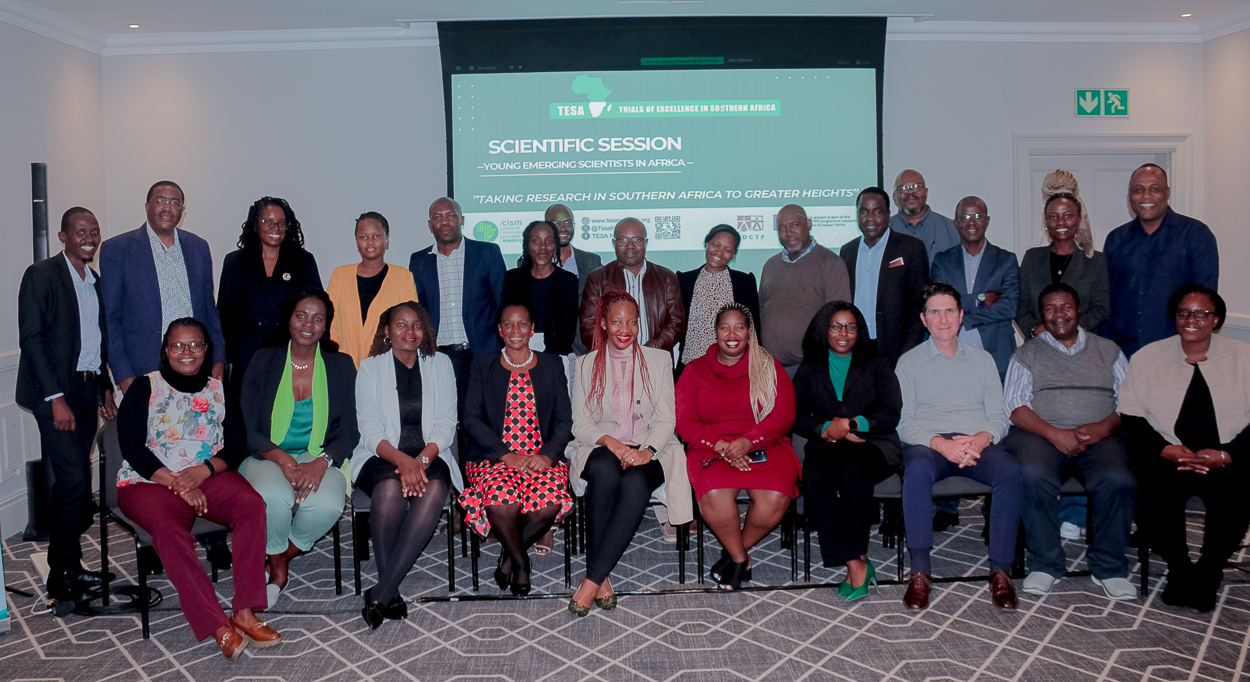
The Trials of Excellence in Southern Africa (TESA) convened a two-day scientific session and steering committee meeting from 8-9 May 2024 at Southern Sun Hotel in Cape Town, SouthAfrica. The meeting was hosted in a hybrid formart with both in-person and virtual particiapation. The first day was dedicated to the second TESA III’s scientific symposium which discussed startegic directions for treatment, prevention and the conduct of clinical trials in Malaria, HIV/AIDS and Tuberculosis(TB).
This session brought together Principal Investigators (PIs), coordinators and fellows from across the different TESA sites to foster robust discussions, to share insights and chart a course to accelerate progress in all their respective projects.The meeting featured presentations on strategic directions, gaps and challenges in the treatment and prevention of Malaria, HIV/AIDS and Tuberculosis by TESA III Site Principal Investigators. Dr Pedro Aide from CISM, Mozambique presented on Malaria while Dr Rosemary Musonda(BHP, Botswana) and Dr Michele Tomasicchio from the University of Cape Town, presented on HIV/AIDS and TB respectively.
TESA and TAGENDI fellows gave oral presentations on their respective research work (see tables 1 and 2). This exercise was designed to give fellows an opportunity to showcase their research activities and receive feedback from the experts in the room on how best to enhance their research. The presentations resulted in a critical review of the ongoing research projects as presented by the fellows. The session also exposed TESA members to other current ongoing research on diseseases other than Malaria, HIV/AIDS and TB that are taking place at different TESA sites.
The second day was dedicated to the fourth TESA III Steering Committee meeting which discussed the progress of TESA programmes and activities, opportunities and challenges faced by different sites in the implementation of their respective work packages.
The meeting served as a platform to review current research efforts, identify knowledge gaps and propose innovative strategies on how to strengthen linkages and collaboration among TESA member research institutions. The meeting concluded with a set of actionable recommendations to guide future research initiatives, covering priorities such as collaborative partnerships, capacity building and training, as well as compliance to procedures including submission of reports by all sites.
Table 1: TESA III Fellows Abstract Presentations
| No. | Name | Research Topic |
| 1 | Agness Farai Ndidza-Majoro-PhD | Influence of Maternal Characteristics during Pregnancy on the Infant Early Life Immune Responses in a High HIV Burdened Setting in Harare, Zimbabwe |
| 2 | Vongai Midred Pepukai | Age-Structured Tuberculosis Stochastic Compartmental Model with Machine Learning for Evaluating the Impact of Vaccination as a Control Strategy. |
| 3 | Bonolo Bonita Phinius | Hepatitis B virus prevalence and diversity among people living with HIV in rural and peri-urban communities in Botswana |
| 4 | Ontlametse T Bareng | Low-Level Viremia among Adults Living with HIV on Dolutegravir-Based First-Line Antiretroviral Therapy is a Predictor of Virological Failure in Botswana |
| 5 | Dr Christabel C.Y. Phiri | Assessment Of Surveillance System Attributes for Leprosy in Mpulungu District Of Zambia |
| 6 | Patrus Shingandji | Experiences of patients lost to follow up during tuberculosis treatment in Oshakati District, Namibia |
Table 2: TAGENDI Fellows Abstract Presentations
| No. | Name | Research Topic |
| 1 | Leah Kashiri | Genetic Diversity of Mycobacterium avium Complex species in Zimbabwe and development of candidate vaccines |
| 2 | Tuelo Mogashoa | High genetic diversity of rifampicin-resistant Mycobacterium tuberculosis strains in Botswana |
| 3 | Consolata Nsanzubuhoro | Enhancing Delivery of Biopharmaceutics Classification System Class II Drugs Through a Novel Alginate/Carrageenan/Oleogel Matrix: A Case Study on Praziquantel for Improved Therapeutic Efficacy |
| 4 | Benigna Gaspar | Genomic epidemiology and antimicrobial resistance of Salmonella in one health context in Southern Mozambique |


